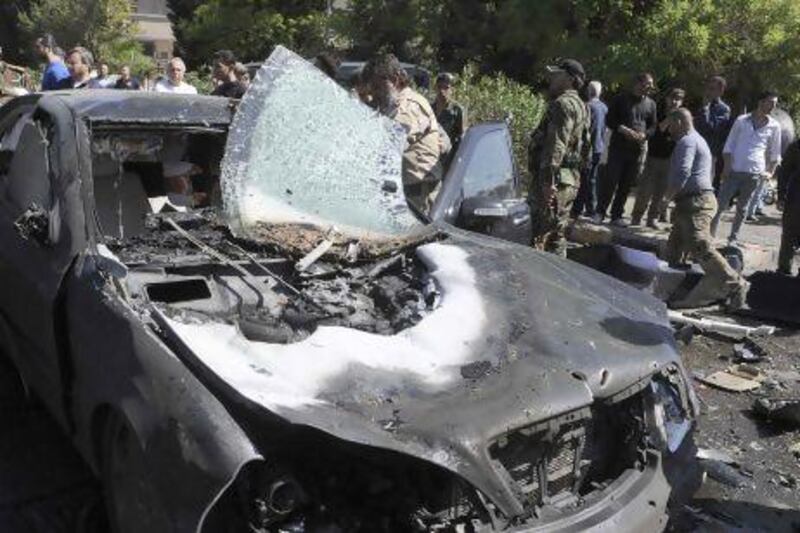GAZIANTEP, TURKEY //The Syrian prime minister Wael Al Halqi survived an assassination attempt yesterday in a massive bomb blast in the centre of Damascus.
The bomb exploded at 9am in the upmarket West Mezzeh area as Mr Al Halqi's convoy passed by. One of his bodyguards and five passers-by were killed.
Mr Al Halqi was not harmed, state media said. The pro-regime Ikhbariya television channel showed him after the blast addressing a committee meeting, but it was not known when the footage was filmed.
"These terrorist bombings are evidence of the bankruptcy and frustration of the armed terrorist groups and the powers backing them due to the victories of the Syrian Arab Army, which is hunting their remnants and working on restoring security and stability to the homeland," Mr Al Halqi said.
The well-protected area is popular with middle class and wealthy residents, and was once home to foreign diplomatic missions.
Most entry and exit roads have been sealed off and security checkpoints control remaining entry and exit routes.
Locals sometimes refer to central Damascus as the Green Zone, a wryly humorous reference to the fortified compound built in the heart of Baghdad by the US military after the invasion of Iraq in 2003.
Damascus is starting to take on a similar atmosphere, some residents say, with a ring of checkpoints separating it from the surrounding countryside and large swaths of territory now beyond government control, while the government continues to trumpet victories over rebel forces.
Mr Al Halqi's convoy was driving along the only path from the neighbourhood to the Mezzeh motorway, a major transport link connecting central Damascus with Lebanon.
"All the other streets are closed so we have to use that road, and so do government officials," said a resident who lives near by. He said the explosion had been massive, throwing debris far from the site of the blast and damaging nearby buildings.
Yesterday's bomb was the latest in a series of assassination attempts - some successful - on prominent government figures.
In December a bomb at a security compound in Damascus injured the interior minister Mohammad Al Sahaar. At the time of the explosion, the Syrian government insisted he had not been hurt, and admitted he had been injured only when he was seen being treated in a Beirut hospital.
By yesterday evening no one had claimed responsibility for the bombing. Some previous bomb attacks in the capital have been claimed by Jabhat Al Nusra, an Al Qaeda affiliated group, but it is not known who is behind many others blasts.
On March 21, a senior pro-regime religious scholar, Mohammad Said Ramadan Al Bouti, 84, was killed in a mosque, also in a well-protected area of Damascus. The government said a suicide bomber was responsible but suspicions quickly circulated that he had been murdered by the regime.
In July key regime members, including Bashar Al Assad's brother-in-law Asef Shawkat, were killed by a bomb at a meeting of the national security council in another fortified part of the city.
Rebel groups, not only Jabhat Al Nusra, have drawn up plans to assassinate major regime officials, including the president, according to opposition factions.
"It is not easy but it is doable with resources and careful planning, they cannot hide for ever," said a rebel involved in planning efforts to seize the capital from regime control.
Also yesterday, the Russian foreign minster Sergei Lavrov warned that claims Mr Al Assad had used chemical weapons were a pretext by western states to take military action against Damascus.
"There is not always a basis for the allegations," he said after a meeting with the African Union Commission.
Moscow has given crucial diplomatic support to the Syrian regime, shielding it from censure at the United Nations Security Council and supplying Mr Al Assad's forces with weapons and ammunition.
"There are probably governments and a number of external players who believe that it is fine to use any means to overthrow the Syrian regime. But the theme of the use of weapons of mass destruction is too serious and we shouldn't joke about it," Mr Lavrov said.
"To take advantage of it for geopolitical goals is not acceptable."
Last week the US joined Britain, France and Israel in saying that Mr Al Assad's forces appeared to have used chemical weapons, possibly the deadly nerve agent sarin, in small-scale attacks on rebel areas.
twitter: For breaking news from the Gulf, the Middle East and around the globe follow The National World. Follow us





